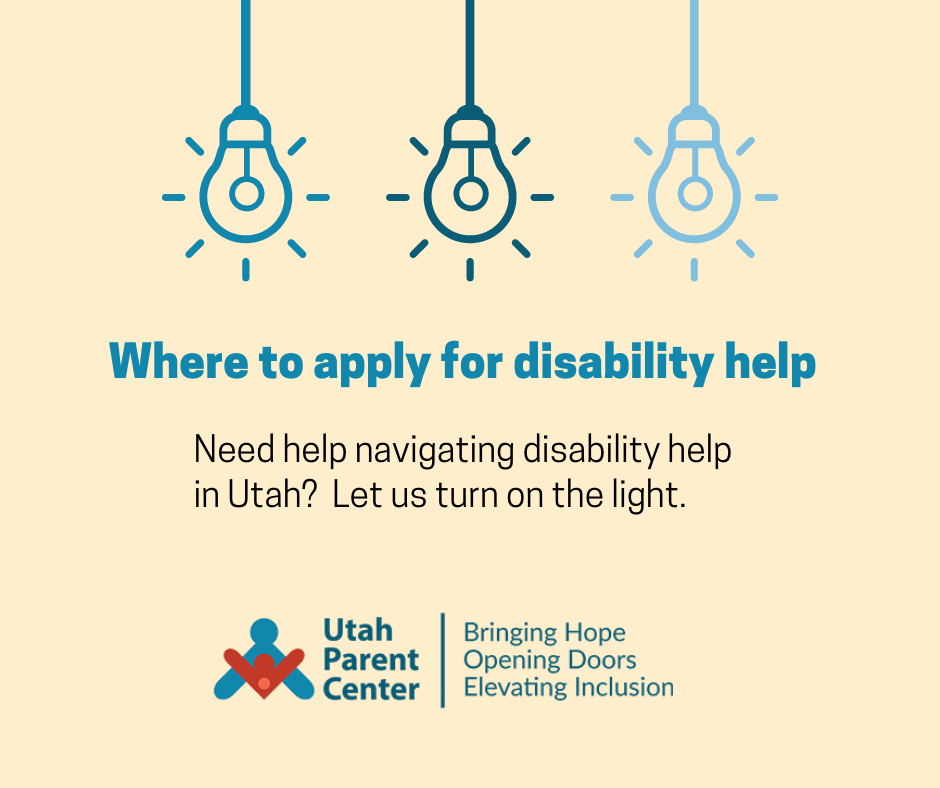
Types of Disability Assistance
There are several different types of disabilities to get help if you or a loved one are struggling with an illness, accident, or disability. An individual may receive one or all of these services.
- Social Security Disability (SSDI) – Federally Funded
- Medicaid Disability Waiver (DSPD) – State Funded
- Vocational Rehabilitation – State Funded
- Medicaid and Supplemental Nutrition Assistance Program – (SNAP) – State Funded
- Housing Assistance (HUD) – State Funded
- Special Education Accommodations (IDEA) – State Funded
- Early Childhood Intervention (IDEA) – State Funded
- Public Transportation – State Funded
What kinds of Disabilities Qualify
An individual may qualify for disability assistance from some of the following conditions that are specific to special education. Each agency has unique qualifications and requirements to receive disability benefits that change over time.
- Autism
- Deaf-blindness
- Deafness
- Developmental delay
- Emotional disturbance
- Hearing impairment
- Intellectual disability
- Multiple disabilities
- Orthopedic impairment
- Other health impairment
- Specific learning disability
- Traumatic brain injury
- Visual impairment, including blindness
Smart Financial Planning to Qualify for Disability Assistance
Disability benefits can be tied to financial needs. Be aware that some agencies are tied to an individual’s financial needs. For instance to receive funding for a Medicaid Disability Waiver through the Department of Services for People with Disabilities (DSPD) an individual can not have combined assets of $2,000 or more. The individual may be a child with disabilities and the child’s financial assets.
A special needs trust could hold assets that are intended to assist the child or individual with disabilities over time. Be careful putting assets in your child or individual with disabilities name tied to their social security number. For instance, a parent may be saving college funds for all of their children. If they have a child with disabilities, the funds saved will need to be placed in a special needs trust so their disabled child would qualify for assistance needed later in life.
If your child or individual with a disability is to inherit assets, it is important to have those assets go into a special needs trust. It is ideal to create a trust and then have specific language included in a will that transfers assets into the trust and not the individual with a disability’s name.
You might be from a middle-class family and struggle with your child’s disability. Please remember that the agency may not consider your household’s income but the child’s income. Your child may be seen as their own household within your household. Be sure to ask if you receive child support for a disabled child as this could be considered a source of income for the child for one agency but not another.
Transferring money into your child’s bank account so they can make purchases can be considered income for your child with disabilities. On the other hand you can get something like a Greenlight card to transfer money to a debit card that your child can use out and about in the community. The Greenlight Card is tied to your social security number rather than the minor child. The child can then have independent community experiences making purchases for family groceries or clothing with caregivers but not receiving income in a bank account with their name and social security number.
Why do I want to qualify for disability assistance?
You might think you don’t want to be dependent on disability assistance and want financial independence for your loved one with a disability. Disability assistance can be very helpful in the different stages of life.
Respite caregivers can take a lot of stress off of a family that has a child with disabilities. The assistance is there but you need to be savvy enough to plan and apply for help. This isn’t just help for parents but actual help for your child with disabilities to go out in the community and build experience and skills.
Medical Health Insurance is a good thing to have with a person with disabilities. You can increase their quality of life by tending to their medical needs. You may have primary insurance through your work employer but Medicaid can be used as secondary insurance for assistance and benefits.
You might want a public bus pass to help with transportation out in the community for medical appointments, education, or employment.
You might need special education accommodations for early childhood intervention, childhood, college or trade schools. When your child is young you might not understand their needs into adulthood.
Did you know that Vocational Rehabilitation may be available to individuals in high school that had an IEP or 504 plan? Vocational rehabilitation may help them build skill and get a job.
It is smart to keep in mind to get yourself or your loved one on waiting lists or lay the foundation to qualify for disability assistance.
Medical Diagnosis for Disability Assistance
If you think you or your loved one might need disability assistance start seeking medical care and testing. Don’t be overwhelmed by the testing or hoops you might need to jump through. Start the journey early with adequate medical care. For instance, t is different to have a doctor suggest that your child may be autistic than getting an official test for an autism diagnosis. The official test may put you on a long wait list but get on the list. The official test may take 3 appointments for the actual testing but your time is worth it. The official test may not be completely covered by health insurance but the financial investment into your child’s future is worth it to qualify for disability assistance later in their life. Don’t be scared of labels or diagnoses as it won’t change you or your loved one. You might need those diagnostic tools in the future to help agencies understand why you or your loved one need help.
Start making appointments over the course of years and figuring out what diagnoses your loved one may have. Tuck these papers away to use later to qualify for disability.
Waiting for Disability Assistance
Sometimes there are years long wait lists for disability assistance. Don’t give up hope but persevere looking into the long game rather than just the hear and now. Jump through the hoops, putting dates on your calendar to stay on those wait lists. You may see your child as small and that you can adequately meet their needs. Just remember that what benefits you can get them to qualify for now will help them qualify for additional benefits in their future.
None of this information is meant to encourage anyone to be deceptive in acquiring any disability assistance but instead to help you understand the parameters for one to qualify. Remember you are looking into the long game to take care of your loved one. These may be hard things to do but are smart to plan for tools to assist in an independent future.













































































